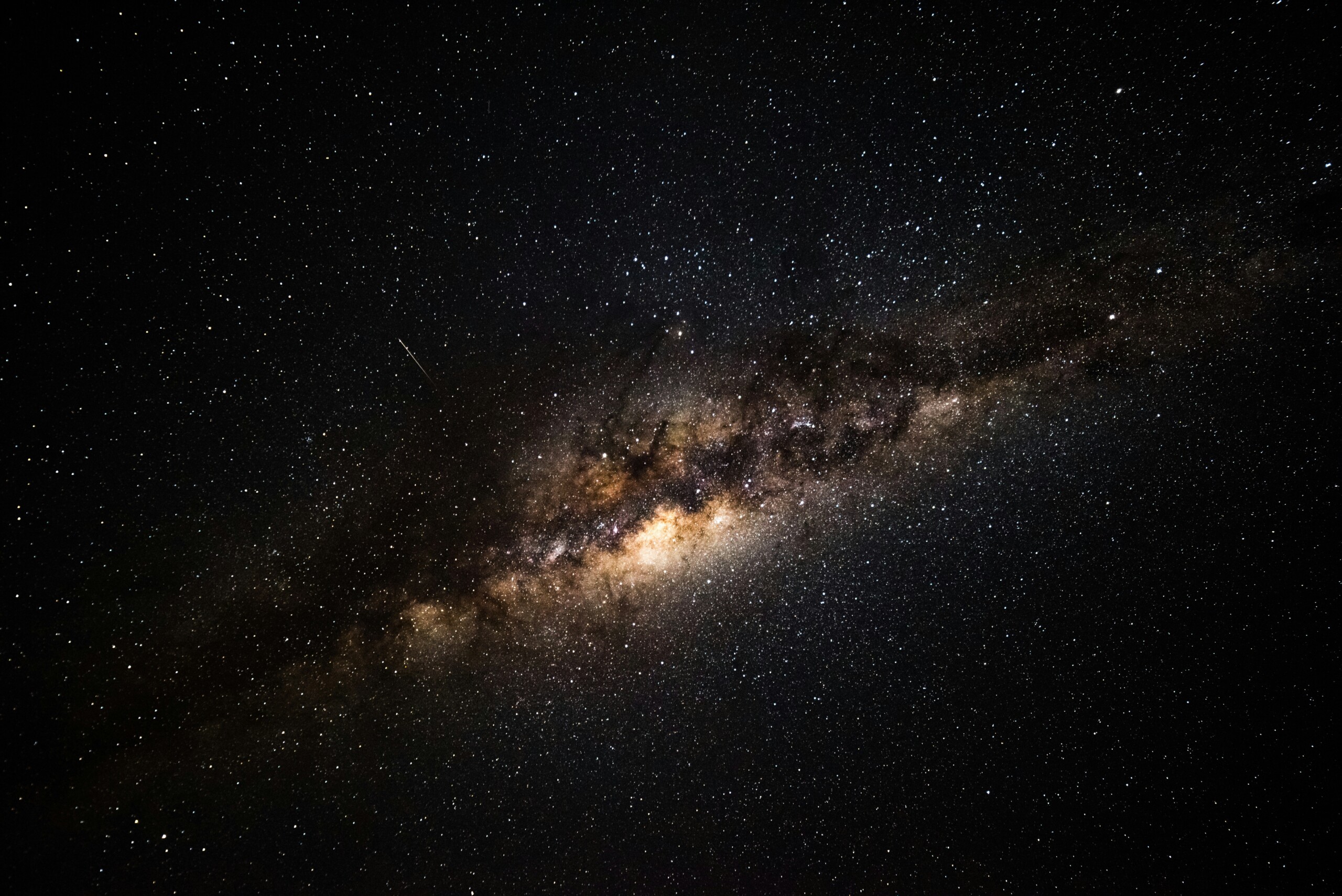It was a quiet morning in my basement carrel in the Calvin College library. I was reading the Gospel of John— the only book of the Bible past Genesis that begins with the words, “In the beginning…”. My family had recently left our beloved Town of Dunn in Wisconsin for my childhood home of Grand Rapids, Michigan, in September 1977, where I would enjoy a full year of research at the Calvin Center for Christian Scholarship (CCCS) with four other faculty Fellows and two student Fellows on a topic we came to call Earthkeeping.
Seeking to understand the text both in English and Greek using my interlineal Bible, I was midway in John 3 when I stopped abruptly at its sixteenth verse. I heard John announce: “For God so loved the cosmos that he gave his only begotten Son.” The cosmos? Did I hear cosmos?
Immediately, I began consulting the numerous commentaries on the Gospel of John in the Calvin College and Seminary library. I could find nothing that addressed the use of the word cosmos in this text. Moreover, Christ in creation was not much of a topic, even by key commentators.
But my continuing search found an answer in Pella, Iowa, a decade later. I had been appointed to the board of the Association for Public Justice (now, Center for Public Justice) that met at a law office in the Standard Oil Building in Chicago.
It was here I met Glenn Andreas, who attended every meeting but always sat to the side as an observer. We had many fine conversations there in the law office of Case Hoogendoorn. After a time, he arranged for me to speak at Central College in Pella, Iowa, and have dinner with him and his wife in their modest Pella home. After dinner, he led me down to his basement—where a sizeable library came into view. Its focus was on Abraham Kuyper, who had founded the Free University of Amsterdam and, from 1901 to 1905, was Prime Minister of the Netherlands. An Abraham Kuyper enthusiast. But also a friend who, knowing of my search for commentary on the Gospel of John, took me to a book by Kuyper: Keep Thy Solemn Feasts, published in 1928. And here, commenting on John 3:16, Kuyper helped answer my question about “the cosmos.” He wrote, including his italics:
“God so loved the world, that he gave it his only-begotten Son.” … God loves the world. Of course not in its sinful strivings and unholy thrashings-about… But God loves the world for the sake of its origin; because God has thought it out; because God has created it; because God has maintained it and maintains it to this day.
We have not made the world, and thus in our sin we have not maltreated an art product of our own. No, that world was the contrivance, the work, and the creation of the Lord our God. It was and is his world, which belonged to him, which he had created for His glory, and for which we with that world were by Him appointed. It did not belong to us, but to him. It was his. And his divine world we have spoiled and corrupted.
And in this is rooted God’s love, that He will repair and renew this world, his own creation, his own work of wisdom, his own work of art, which we have upset and broken, and polish it again to new lustre. And it shall come to this. God’s plan does not miscarry, and with divine certainty, he carries out the counsel of his thoughts. Once that world in a new earth and a new heaven shall stand before God in full glory.
But the children of human beings, meanwhile, can fall out of that world. If they will not cease to corrupt his world, God can declare them unworthy of having any longer part in that world…
And therefore whoever would be saved with that world, as God loves it, let him accept the Son, whom God has given to that world, in order to save the world.”1
After my chapel talk the next morning, I played some notes on the pipe organ once everyone had left, and soon was winging my way back home via Madison to Oak Knoll to join Ruth, the Sand Hill Cranes, and the Great Marsh: Waubesa Wetlands. Yes, I was thinking with Kuyper, “Let whoever would be saved with that world, as God loves it, let them accept the Son, whom God has given to that world, in order to save it.” Let us image God’s love for the world, enlightened and energized by God’s Son whom God has given to save it.” Jesus Christ is Lord of Creation.
Imaging God’s Love for the World by Accepting God’s Son
John tells us that God expresses his love for the world by giving his Son to save it. Remarkably, human beings are invited by God to be saved with that world, and they eagerly await the glory of that redeemed world.
But there is the problem that on account of “its love of things eternal, “says Kuyper, Christendom has “neglected to give due attention to the world of God’s creation,” leading some sects “to a mystic worshiping of Christ alone, to the exclusion of God the Father Almighty, Maker of heaven and earth.” For such, “Christ was conceived exclusively as the Savior, and His cosmological significance was lost out of sight.” Yet, the heavens continue to glorify God (Psalm 19:1) as does God’s cosmos.
John, in his gospel, tells us that Christ is the ‘eternal Word, by Whom all things are made, and who is the life of all people.’ Kuyper reminds us that the apostle Paul also testifies that ‘all things were created by Christ and consist by Him.’ The work of redemption is not limited to the salvation of individual sinners, but extends itself to the redemption of the world—as “the organic reunion of all things in heaven and on earth under Christ as their original head.” And Kuyper reminds us what “Paul declares: ‘The whole creation groaneth waiting for the bursting forth of the glory of the children of God.’”2
Is Jesus Christ Lord of Creation?
Through Jesus Christ, God created the world, holds everything together, and reconciles all things. Followers of Jesus Christ have known this remarkable teaching of Colossians 1:15-20. The depth and significance of this passage is there for all to see:
“[Christ] is the image of the invisible God, the firstborn over all creation. For by him all things were created: things in heaven and on earth, visible and invisible, . . . all things were created by him and for him. He is before all things, and in him all things hold together. And he is the head of the body, the church; he is the beginning and the firstborn from among the dead, so that in everything he might have the supremacy. For God was pleased to have all his fullness dwell in him, and through him to reconcile to himself all things, whether things on earth or things in heaven, by making peace through his blood, shed on the cross.”
Here we can observe three things: First, Christ is the Creator of all things (ta panta), the Author of all things. Not only did he create all things, but all things were created for him.
Second, in Christ all things (ta panta) hold together. Everything derives its integrity from Christ, and without him, things would fall apart. Christ is the Sustainer and Integrator of all things.
Third, God reconciles all things (ta panta) to himself through Christ by making peace through his blood, shed on the cross. Christ is the Reconciler and Harmonizer of all things.
Clearly, these claims of Jesus Christ on the world are thoroughly comprehensive. As Author, Integrator, and Harmonizer, Jesus Christ cannot be dismembered into Savior on the one hand and Maker of the material world on the other. The spiritual cannot be separated from the material. Jesus Christ is the Beautiful Savior and Lord of Creation.3
Kuyper, rooting himself in the testimony of the Scriptures, reminds us that “the final outcome of the future … is not the merely spiritual existence of saved souls, but the restoration of the entire cosmos, when God will be all in all under the renewed heaven on the renewed earth.” He says, “Certainly our salvation is of substantial weight, but it cannot be compared with the much greater weight of the glory of our God, Who has revealed His majesty in His wondrous creation.”
“This creation is His handiwork,” and even though marred by sin, God so loves the cosmos that its “restoration is and ever will be the salvation of that which was first created, the theodicy of the original handiwork of our God.” And thus, we put an end once and for all to “contempt for the world” and “neglect of temporal and under-valuation of cosmical things”. “Cosmical life has regained its worth not at the expense of things eternal, but by virtue of its capacity as God’s handiwork, a revelation of God’s attributes, and God’s love for the world. All of which can inspire human beings to reply with gratitude and joy to image God’s love for the cosmos.
Footnotes
- Kuyper, Abraham. 1928. Keep Thy Solemn Feasts: Meditations by Abraham Kuyper. Wm B. Eerdmans Publishing Company, Grand Rapids, Michigan, pp. 70-71. Translated by John Hendrik deVries from Kuyper, 1903. “Alzoo lief heeft God de wereld gehad!” Chapter 7. In: “Vier Uwe Vierdagen (Nahum I:15). Meditatiën van Dr. A. Kuyper. Amsterdam: Höveker & Wormser, 56-57.
- DeWitt, Calvin B. 2003. Science, Theology and Technology: Responsible Praxis within the Ecological Order, A lecture for the inauguration of the Kuyper Center for Public Theology, presented at The Princeton Theological Seminary, Princeton Theology Bulletin 34(1):55-83.
- DeWitt, Calvin B. 1998. Praising Rembrandt but Despising His Paintings, 1996 Annual Abraham Kuyper Lecture, presented at Fuller Theological Seminary. In: DeWitt, Calvin B. 1998. 1998. Caring for Creation: Responsible Stewardship of God’s Creation. Grand Rapids: Baker Books 35-37.























This reading of John 3:16 reminds me of the Hebrew concept of Tikkun, “putting the world back together.” I’ve loved this idea ever since I first learned that word and its significance, and have understood Romans 8 in that light ever since. But I never noticed it here in John 3:16! It’s clear from the passages you’ve drawn together here that this is exactly how the New Testament writers understood the death and resurrection of Jesus Christ. Beautiful.
I am greatly encouraged to read this perspective, concerning which we hear precious little in Bible-believing, salvation-centered churches. I would be interested in additional writings on this topic and to know whether there exists any online communities dealing with this gloriously broad vision of salvation.
I found some good insights in this article. But does kosmos here refer to the created world? It often refers rather (by metonymy) to the world’s inhabitants; I would consider John 1:10, John 7:4, John 12:19, John 15:19, John 17:21, and John 18:20, among others, to be clear examples from the same book. Considering the context of John 3:16–testimony, faith, salvation–I would think that’s how it’s being used there, too.